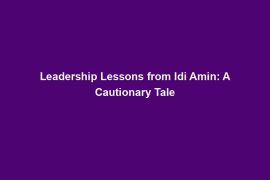Hey there, have you ever heard of Yoweri Museveni? If not, let me give you a quick background on this fascinating leader. Museveni has been the President of Uganda for quite some time now – in fact, he’s been in power since 1986! That’s over three decades of leadership experience under his belt.
But what makes Museveni stand out from other leaders? Well, his leadership style and governance strategies have left a lasting impact on Uganda. He’s known for his emphasis on stability and security, which has helped keep the country peaceful and secure. Additionally, his commitment to economic development has transformed Uganda’s economy, paving the way for growth and prosperity.
Now, you might be wondering – what can we learn from studying Museveni’s leadership style? That’s where the real meat of this blog post comes in. We’ll delve into the leadership lessons we can glean from Museveni, from his focus on stability and security to his communication skills with the Ugandan population. Trust me, there’s a lot to unpack here!
So, get ready to dive into the world of Yoweri Museveni and discover the valuable leadership lessons that can be applied in today’s world. Let’s explore how his strategies for effective governance can inspire and guide leaders in the 21st century. Stay tuned for some eye-opening insights and practical tips for effective leadership – you won’t want to miss this!
Emphasis on Stability and Security
When it comes to leadership, one of the key lessons we can learn from Yoweri Museveni is the importance of prioritizing stability and security in your nation. Museveni’s unwavering focus on maintaining peace and security in Uganda has been a cornerstone of his successful governance over the years. By investing in security forces and implementing policies that promote stability, Museveni has been able to create a safe environment for his citizens to thrive in.
Think of it this way – just like how a gardener needs to tend to the soil and protect the plants from pests in order for a garden to flourish, a leader must ensure that their nation is stable and secure in order for progress and development to take place. Museveni’s commitment to stability has not only helped to prevent conflict and unrest in Uganda but has also provided a solid foundation for economic growth and social development.
Commitment to Economic Development
Another leadership lesson we can take away from Museveni is his dedication to driving economic development in Uganda. Museveni recognized early on the importance of implementing policies that prioritize economic growth and development in order to lift his nation out of poverty and create opportunities for prosperity.
By focusing on key sectors such as agriculture, infrastructure, and investment, Museveni has been able to revolutionize Uganda’s economy and turn it into one of the fastest-growing economies in Africa. Just like how a carpenter needs to carefully plan and build a house from the ground up, a leader must also have a clear vision and strategy for economic development in order to create a strong and sustainable economy for their nation.
Communication and Engagement with the Population
Lastly, Museveni’s ability to effectively communicate and engage with the people of Uganda has been instrumental in maintaining his popularity and support as a leader. By connecting with his citizens, listening to their concerns, and addressing their needs, Museveni has been able to build trust and rapport with the population.
Imagine having a friend who always takes the time to listen to your thoughts and feelings, and who is always there to offer support and guidance. This is the kind of relationship that Museveni has cultivated with the people of Uganda through his effective communication and engagement strategies.
In conclusion, by studying Museveni’s leadership lessons on stability, economic development, and communication, we can learn valuable insights on how to be effective leaders in our own roles. Whether you’re a manager at a company or a community leader, incorporating these lessons into your leadership style can help you inspire others, drive progress, and create positive change in your environment. Stay tuned for the next section where we’ll explore how these lessons can be applied in modern governance!
Implications for 21st Century Leaders
Now that we’ve delved into the leadership lessons we can learn from Yoweri Museveni, it’s time to explore how his strategies can be applied in today’s governance landscape. Let’s take a closer look at how leaders in the 21st century can benefit from studying Museveni’s leadership style.
Application of Museveni’s Leadership Lessons in Modern Governance
Museveni’s emphasis on stability and security is a crucial lesson that leaders today can implement in their own governance strategies. In a world fraught with uncertainties and challenges, maintaining stability is essential for fostering growth and development. By prioritizing stability, leaders can create an environment where innovation thrives and progress flourishes.
Additionally, Museveni’s commitment to economic development serves as a blueprint for leaders looking to revitalize their economies. By investing in policies that prioritize economic growth and development, leaders can create opportunities for their citizens and improve overall quality of life.
Challenges and Criticisms of Museveni’s Leadership Style
While Museveni has been hailed for his leadership style, it’s important to acknowledge the criticisms and challenges that have been brought against him. Some critics argue that Museveni’s long tenure in power has led to authoritarian tendencies and a lack of political freedom in Uganda. These criticisms highlight the complexities of governance and the need for leaders to constantly reassess their strategies.
Conclusion
In conclusion, studying Yoweri Museveni’s leadership lessons offers valuable insights for leaders in the 21st century. By applying his strategies for stability, economic development, and effective communication, leaders can navigate the challenges of modern governance and drive positive change in their respective countries. As we reflect on Museveni’s legacy, let’s remember the importance of effective governance in leading nations towards prosperity and success.

